Projects always need resources such as materials, labor and equipment, which generate costs. Those costs must be estimated and controlled throughout the project life cycle to complete the project.
What Is Project Cost Management?
Cost management is the process of planning and managing the budget of a business or project. In the case of a project, it helps the project manager estimate what the project will cost and set controls to reduce the chances of the project going over budget.
Effective cost estimation and cost management require the right software. ProjectManager is the perfect tool to estimate and track project costs, resources and workload. Our Gantt charts, project calendars and timesheets allow you to manage costs, time and tasks in one place. Get started for free.
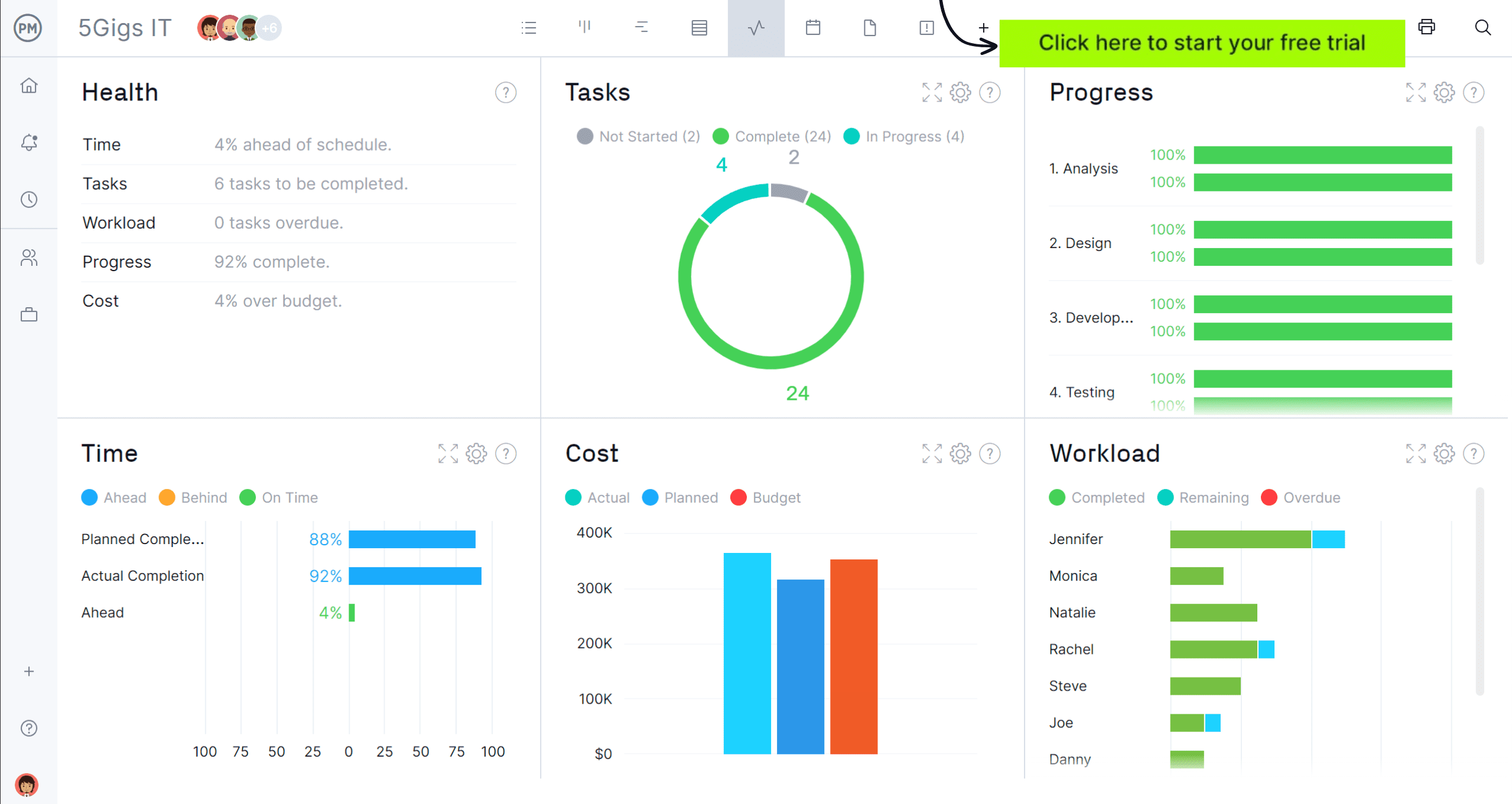
How to Manage Project Costs in 5 Steps
The four steps below outline how the cost management process works in project management.
1. Resource Planning
Resource planning is the process of forecasting future resource requirements for a business, project or scope of work. To create a resource plan, you need to start by defining the project scope, a document that details the project activities that will be done.
Once the project activities have been defined, project managers usually rely on historical data, expert opinions, and resource planning tools such as a resource breakdown structure (RBS) to estimate the resources that will be needed.
The resource planning of a project can be divided into the following steps.
- Estimate Project Resource Requirements: Determine the type, quality and quantity of resources needed for a project to be successful.
- Assess Resource Capacity: Evaluate the organization’s resource capacity and determine how many resources are required to complete a project by considering the skills, availability and working hours of team members.
- Purchase Project Resources: Buy or rent products, goods and services by paying a desired amount of money. This procurement involves requesting, ordering and obtaining resources.
- Make a Resource Schedule: Assigning resources to projects and tasks within a specific time frame to ensure that all resources are not over or under-allocated at any point in the project.
- Establish a Resource Tracking System: Software that monitors the work on a project, collecting data on resource utilization, availability, performance and reporting to identify areas of inefficiency or overuse.
2. Project Cost Estimation
Project cost estimating consists of assigning costs to the resources you need to execute tasks. Making a project estimate is one of the most important steps in the cost management process because it lays the base for your project budget.
Within this project cost estimation process, there are specific actions that organizations need to take.
- Implement Cost Estimation Techniques: There are several project cost estimating techniques you can use depending on the characteristics of your project including analogous, parametric, bottom-up and three-point estimation.
- Use a Cost Breakdown Structure: It estimates costs by breaking down the project into tasks and estimating how much each task will cost to complete.
- Make a Project Estimate: Forecast direct and indirect costs, such as labor, materials, equipment, overhead and vendor fees.
- Establish a Cost Baseline: A cost baseline is the total cost of a project’s activities and resources plus any known risks. It’s calculated by adding the project’s cost to a contingency reserve.
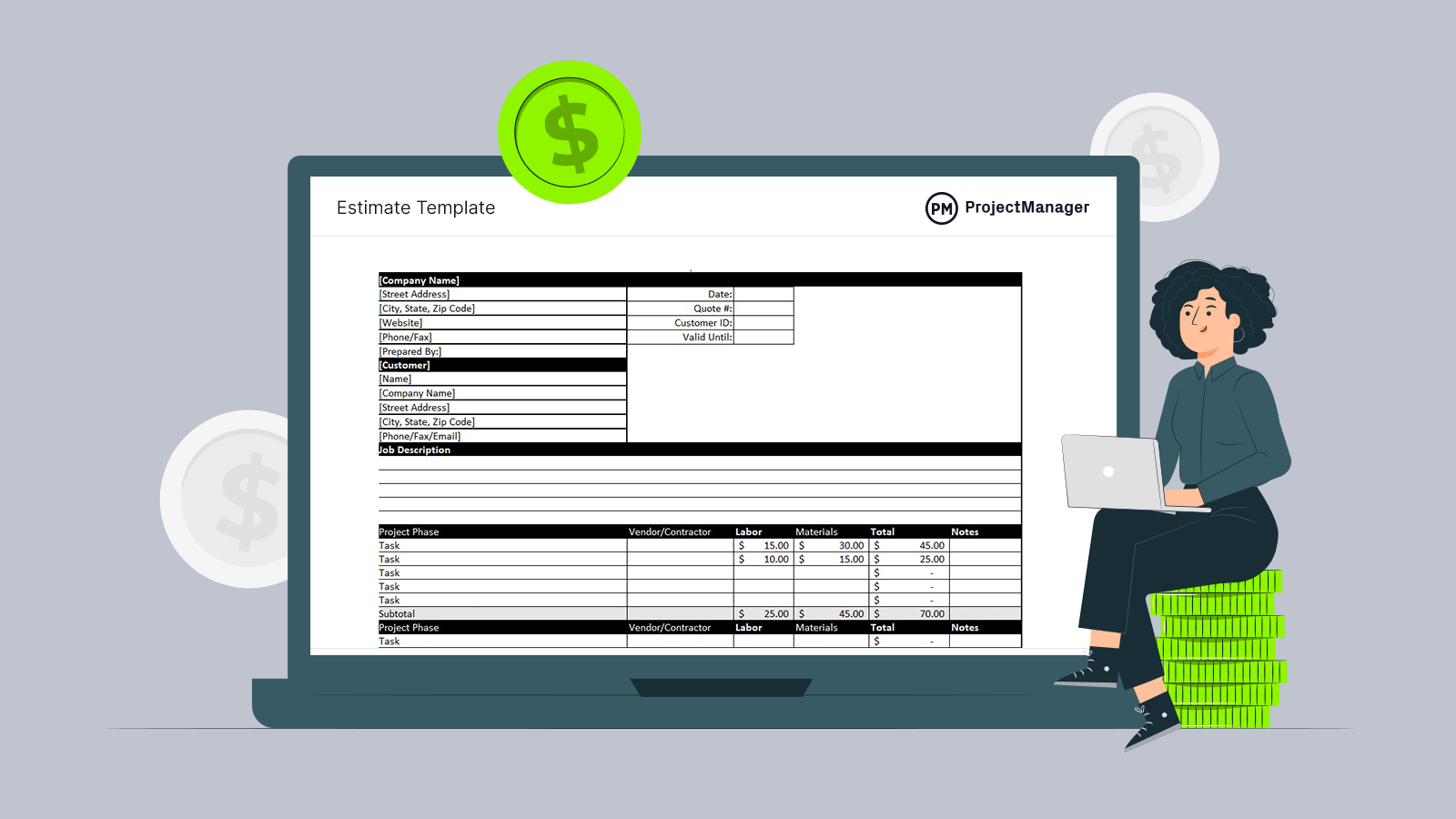
Get your free
Project Estimate Template
Use this free Project Estimate Template for Excel to manage your projects better.
3. Cost-Benefit Analysis in Project Management
A cost-benefit analysis goes beyond project cost estimation. It’s a systemized approach to assess the advantages and disadvantages associated with a particular decision, project or policy. In other words, this project cost analysis weighs the cost of something against the return on investment or benefits. If the benefits outweigh the costs, then it makes it easier to decide to follow through.
4. Cost Budgeting in Project Management
Based on your cost estimates, you can now create a project budget, which is simply the sum of all your project costs. Make sure to include all project costs, including direct, indirect, fixed and variable costs. A project budget should also include contingency reserves in case there’s work that needs to be redone, or a risk has struck the project and risk mitigation strategies need to be taken.
Once the project starts, the project budget is a baseline used to compare actual costs vs. estimated costs. Therefore, project budgets allow project managers to quickly understand if their costs are too high and if there’s a risk of cost overrun.
5. Cost Tracking & Cost Control
Cost control refers to all the activities, guidelines and procedures taken to minimize and track project costs. Poor cost control processes can affect the profitability of a project, but luckily project management software can help you to easily keep track of costs with tools such as timesheets, workload planners and project dashboards.
As with the other steps of the project cost management process, the project cost tracking and control stage involves a set of sub-tasks that will vary from one organization to another. However, here are some of the most common actions taken to monitor project costs.
- Project Cost Accounting: A type of accrual accounting that monitors a project’s costs, revenue and profitability.
- Cost Variance Monitoring: Cost variance in project management is the process of evaluating the financial performance of a project by comparing what was budgeted versus what was spent.
- Calculate the Cost Performance Index: This measures the conformance of the actual work completed (measured by earned value) to the actual cost incurred.
- Manage Project Cash Flows: The process of tracking and controlling the movement of money in and out of a project.
- Make a Project Cost Report: A document that provides an overview of the costs associated with the project.
The procedures, guidelines and tools used in each of the steps of the project cost management process should be described in great detail in a cost management plan. This document is an important component of any project plan.
What Is a Project Cost Management Plan?
A cost management plan is an outline of the cost estimation for the project—but that includes all allocation and how the project manager will control those costs to bring the project in as budgeted.
A cost management plan must take into account the resources that impact the project budget, whether materials or people. There are also fixed, variable and overhead costs. All these must be calculated to know what your financial commitment to the project will be.
Last but not least is the stakeholder, who has a vested interest in keeping costs down. Cost overrun is a problem many projects experience, but not one that stakeholders will tolerate well. Keep the stakeholder in mind when formulating your cost management plan. They need to stay in the loop and get reports throughout the project.
Project Cost Estimate Template
This free project cost estimate template for Excel lets you list all the costs related to your project resources such as labor, materials and equipment rental. Once you’ve accurately estimated these costs, you can create a project budget.
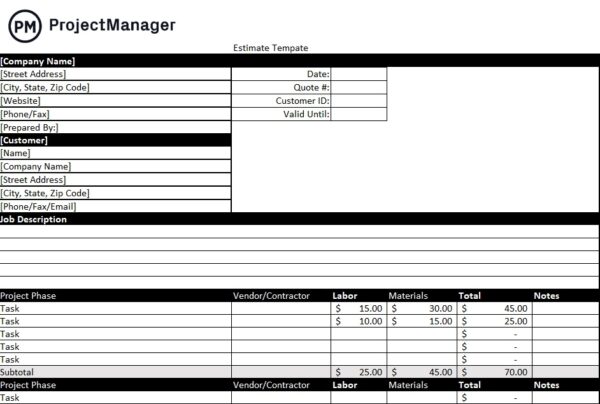
Cost Management Plan Outline
Here are some key elements that must be included in a cost management plan:
- Estimation Methods: Explain which cost estimation method was employed, such as parametric, bottom-up, three-point, etc.
- Units of Measure: To measure costs accurately, it’s important to establish units of measure for your labor, materials and equipment. Some examples of measurement units can be staff hours, square feet, tons, kilograms, etc.
- Cost Baseline: Based on your cost estimates, you must define a cost baseline that marks the spending limit for your project.
- Cost Control Thresholds: Establishing thresholds to monitor cost performance is important. This simply means that when cost variation reaches a certain percentage, the project team will take cost management actions.
- Performance Measurement Methods: Establish how the cost performance will be measured to see if you’re meeting the goals and expectations of the project. To do so, you’ll need a cost-tracking system and earned value management (EVM) techniques.
- Reporting Guidelines: You need a format and communication channels to report your findings as you monitor the project’s progress and present this data to your stakeholders.
Why Is Cost Management Important in Project Management?
The main reason why cost management is so important in project management is that your cost management plan includes the guidelines and procedures needed to stay on budget. This is critical because otherwise, the organization could lose money as costs exceed profits.
Related: Best Project Cost Management Software: Free & Paid Options Ranked
The cost management process begins in the planning phase of the project, where costs are estimated and then a project budget is defined. Then, when the project is executed, the expenses are carefully monitored and recorded to ensure they align with the budget.
When you have a project budget, it sets a baseline for project costs. That means it governs the decisions and directions you take when managing costs on your project. This helps you keep the project on track without overspending.
Project Cost Management Tips
The following are some tips to keep in mind as you’re working on managing your project costs.
- Plan for Inflation: Pricing is not set in stone, and any good budget will take this into account by allowing for a range of costs.
- Account for Natural Disasters or Potential Events: You must have room in your budget for a weather event, personal issue or another unknown that will delay the project.
- Other Unexpected Costs: Not all unexpected costs are random. There can be legal issues, penalties associated with the project or unexpected labor costs, all of which you can’t budget for, but can inform your budget.
- Track in Real-Time: Having software to monitor the budget as you execute the project is key for managing costs. However, if you’re looking at data that isn’t current, you won’t be able to act swiftly to resolve issues. Therefore, you want to have software with real-time data tracking.
- Respond Promptly: Regardless of how you discover a discrepancy in your project cost, you must act immediately. The longer you wait, the more money is wasted.
- Size Accordingly: Some people think smaller projects don’t need project cost management. But small or large, you’ll want to manage costs.
To best manage project costs, you must know your project inside and out. The best way to do that is at the start of the project by creating a thorough project charter.
ProjectManager Is the Best Project Cost Management Software
ProjectManager is online software with the tools you need for cost management planning across all project phases. Because our software is online, project data is delivered in real time so you can immediately gauge the accuracy of your cost estimates against the actual expenditure.
Allocate Resources and Track Costs
ProjectManager’s Gantt charts, kanban boards, task lists and project calendars have project cost tracking features that allow project managers to assign tasks to their team members and automatically calculate labor costs based on their work hours and pay rate, which greatly facilitates tracking project costs. Non-human resources and costs can also be added to each task.
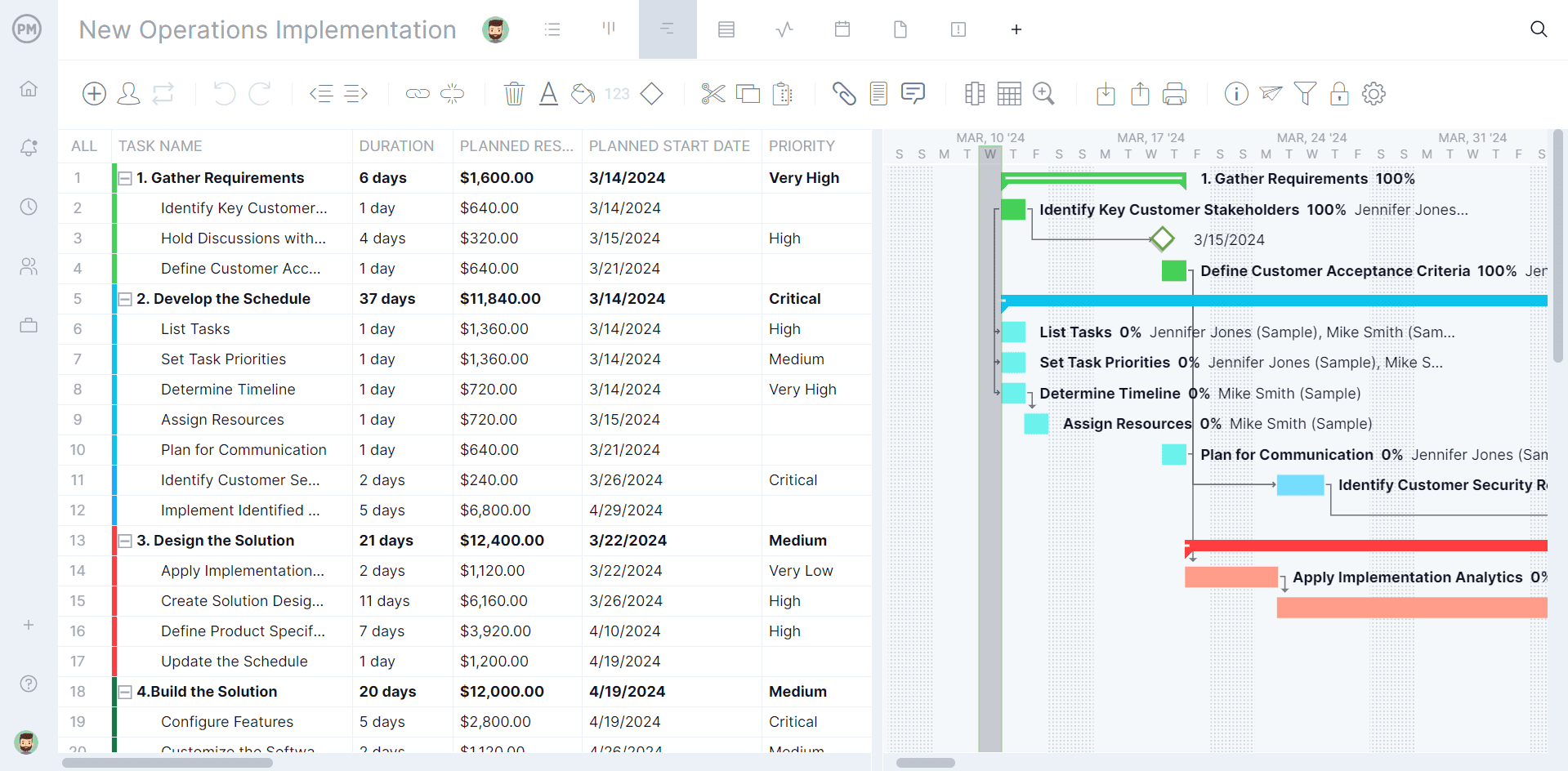
Our workload management chart helps you keep your team’s workload balanced by indicating who is over or underallocated with tasks, which reigns in costs. We also have easy-to-use timesheets that allow organizations to track the work hours of project teams and facilitate the payroll process, where team members can submit with one click and project managers can approve with one click.
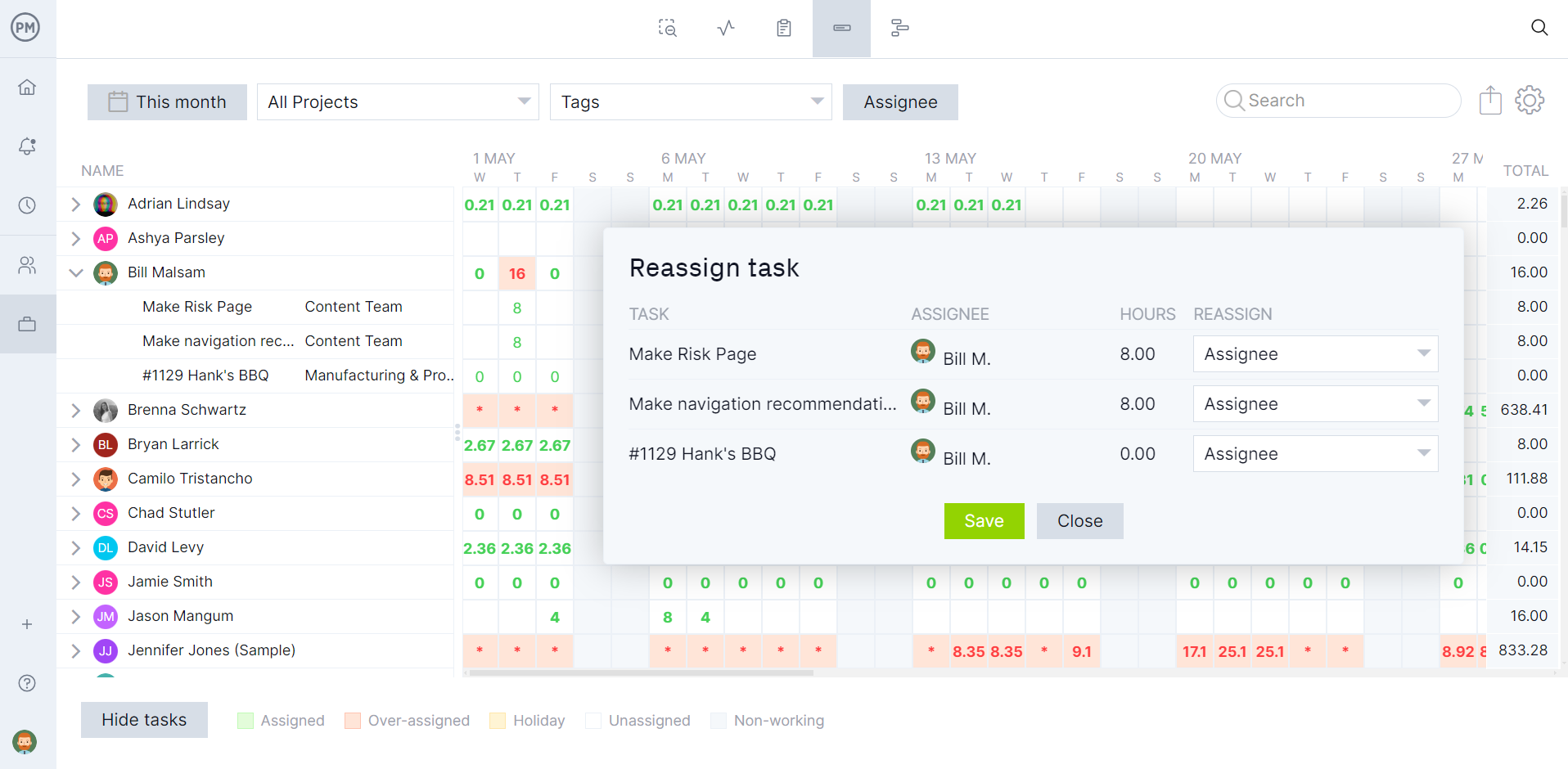
Monitor Costs, Timelines and Resources with Real-Time Dashboards
One of our most powerful features for cost management is our project dashboard, which tracks project costs in real time so you can keep a close eye on your budget. Besides this, it also helps track project progress, workload distribution and timelines.
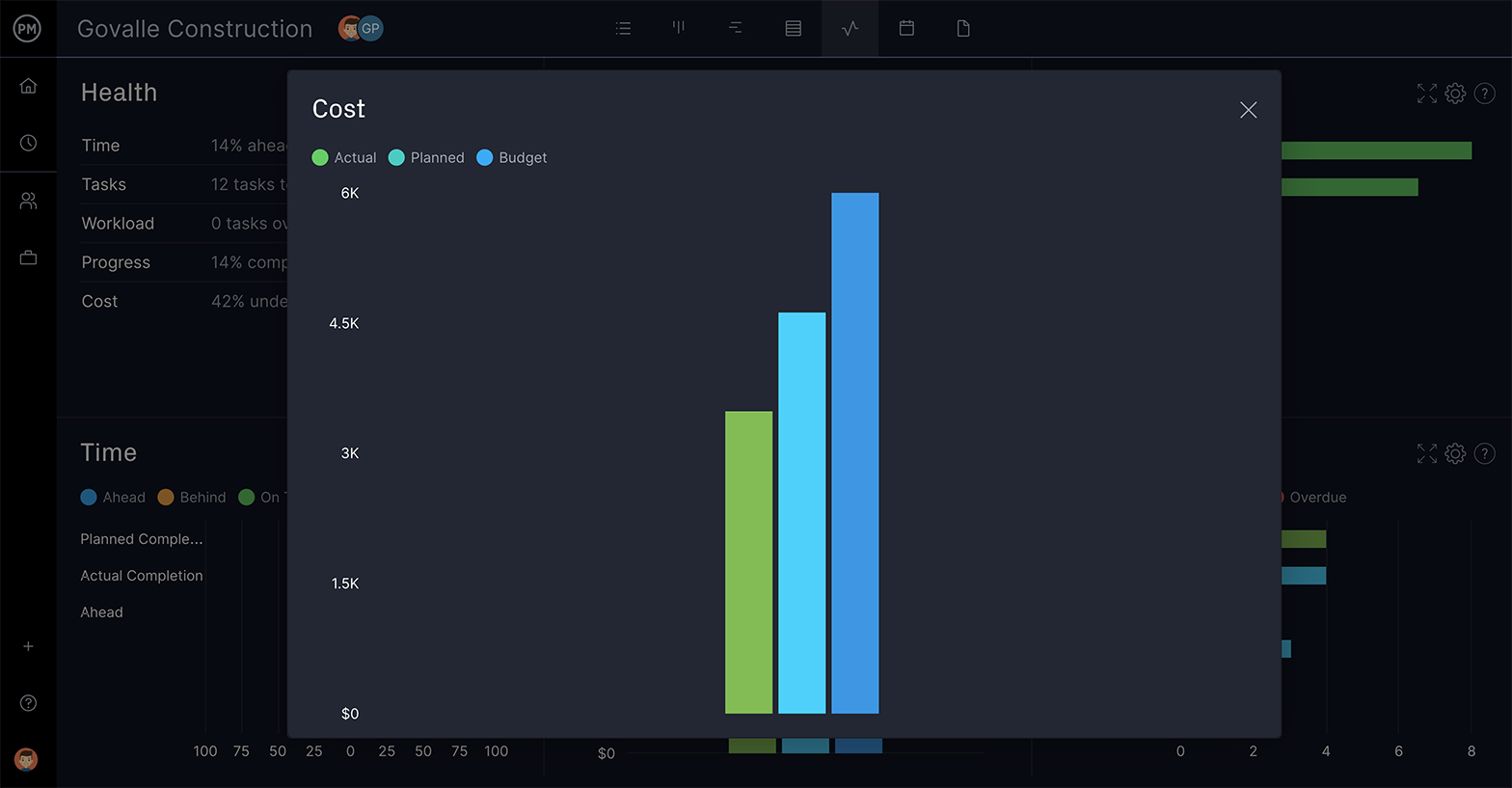
More Free Project Cost Management Templates
We offer dozens of project management templates to help you manage your projects. Here are some templates to assist you as you go through the project cost management process.
Project Budget Template
Our project budget template is ideal to document all your costs and set a baseline for your projects. It can be easily customized to meet the needs of your organization.
Resource Plan Template
You can’t manage costs without solid resource planning. Our resource plan template is the perfect tool to keep track of all the different resources that you’ll need to execute your projects.
Cost-Benefit Analysis Template
Projects must be profitable, otherwise, it’s not a good idea to execute them. Before you start a project, make sure you do a cost-benefit analysis beforehand. Our cost-benefit analysis template is a great place to start.
Learn More About Managing Project Cost
When you’re working on cost management, you’re establishing policies and procedures to manage and control your project costs. Jennifer Bridges, PMP, speaks to the core knowledge you need to know to understand cost management on any project in this short tutorial video.
Here’s a thumbnail for your reference.
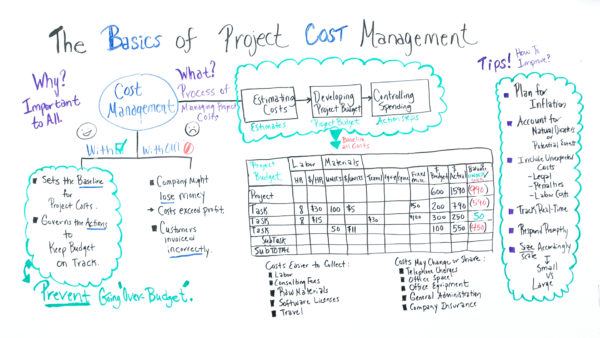
Related Project Cost Management Content
As stated above, cost management is one of the most critical factors for success in project management, which is why we’ve created dozens of blogs, templates, ebooks and guides on this and other related topics. Here are some of them.
- How to Track Project Expenses
- Best Project Cost Management Software: Free & Paid Options Ranked
- Best Project Accounting Software: Free & Paid Options Ranked
- What Is a Cost Breakdown Structure (CBS) In Project Management?
- What Is Job Costing? When to Use a Costing Sheet (Example Included)
- Job Estimate Template
- Cost of Quality (COQ): A Quick Guide
Project cost management is a data-driven process and requires project management software robust enough to digest and distribute the information. ProjectManager is online project management software with tools, such as a real-time dashboard, that can collect, filter and share your results in easy-to-understand graphs and charts. Try it today with this free 30-day trial.

